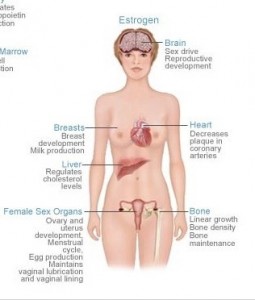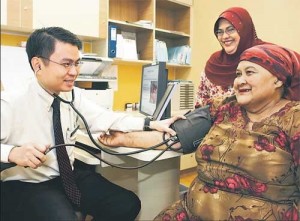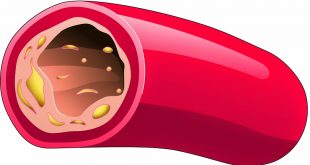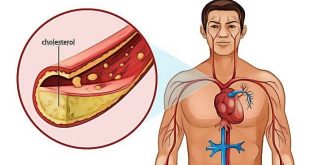Estrogen
The human body contains many kinds of hormones, which help to regulate many functions. One of these hormones is Estrogen. Estrogen is a natural hormone that is important for women. Estrogen is also known as the sex hormone. The ovary produces most of the estrogen hormone in the woman’s body.
Functions Of Estrogen
Estrogen controls many functions in a woman’s body from the time of menarche (first menses) until menopause. A woman needs estrogen to maintain normal reproductive functions.
Estrogen:
- Ensures the development of secondary sexual characteristics in girls like breasts and pubic/armpit hair
- Ensures girls attain menarche (first menses)
- Ensures regular monthly menstrual cycles
- Matures the female reproductive system
- Strengthens the cardiovascular and musculoskeletal system
- Maintains healthy hair, skin, blood vessels and urinary tract
 Photo 1: Functions Of Estrogen In A Woman’s Body
Photo 1: Functions Of Estrogen In A Woman’s Body
Estrogen is also produced synthetically in the form of medications. Medications that contain synthetic estrogen are contraceptive medications and Hormone Replacement Therapy.
Contraceptive Medication (Medication Used For family Planning)
For many women in the reproductive age group, contraceptive medication is an effective way to prevent unplanned pregnancies. Generally, contraceptive medications are safe and effective for healthy women.
However, hypertensive women need to be careful when choosing a contraceptive medication. This is due to the fact that medications that contain estrogen can cause an increase in the user’s blood pressure. Contraceptive medications can increase the systolic blood pressure about 8 mmHg and the diastolic blood pressure about 6 mmHg. In addition to that, a higher dose of the same medication can cause a higher rise of the blood pressure.
A hypertensive woman who is using estrogen containing contraceptive medications can suffer from an increase of her blood pressure. If her blood pressure remains uncontrolled for a long period, it puts the woman at risk for complications of high blood pressure. However, the blood pressure will stabilize once the medication is stopped.
 Photo 2: Contraceptive medications
Photo 2: Contraceptive medications
About 5% of healthy women can also develop hypertension while on contraceptive medication. The women who are at risk are those who:
- Suffered from hypertension during pregnancy
- Have family history of hypertension
- Suffer from kidney disease
- Are obese
As such, the risk of using contraceptive medication should be weighed against the risk of an unplanned pregnancy. This important decision can be made with the help of your doctor. For a woman with hypertension, there are other more appropriate contraceptive methods that can be used.
How To Choose An Appropriate Contraceptive Method?
Once the decision is made to start contraceptive methods;
- Seek your doctor
- Your doctor will check and record your blood pressure
- Discuss the pros and cons of every available contraceptive method
- Choose an appropriate method.
- If you choose a contraceptive medication that contains estrogen, see your doctor every 6 months to check your blood pressure
- If your blood pressure becomes higher, the doctor can:
- Change to another contraceptive medication that contains a lesser amount of estrogen or,
- Change to another method
7. Continue visiting your doctor every 6 months for monitoring.
Hormone Replacement Therapy (HRT)
Women who attain menopause will suffer a drastic reduction of estrogen in their body. This depletion of estrogen causes a variety of symptoms and problems that can disturb a woman. Hence, hormone replacement therapy is an important treatment for menopausal women (refer to functions of estrogen in the body).
HRT will enhance the quality of life for a menopausal woman and reduces medical problems. Hence, your doctor would advice you to start HRT during menopause.
The quantity of estrogen contained in HRT is much less when compared to a contraceptive medication. As such, HRT does not disturb your blood pressure. As a matter of fact, the use of HRT has been shown to lower blood pressure in a hypertensive. As such, all women who are hypertensive should start HRT once other medical problems are ruled out.

Photo 3
How Do You Start Taking Hormone Replacement Therapy?
- Visit your doctor to discuss the initiation of HRT for you.
- After examining you, your doctor will help you choose a HRT that is suitable for you.
- Your doctor will monitor your blood pressure during your regular follow up appointments.

Photo 4
References
- KKM 21-22June 2001 Family Planning program guideline
- WHO 1998 Health workers’ manual on FAMILY PLANNING OPTIONS
- WHO 2002 Selected practice recommendations for contraceptive use
- Yanga Xiao-Ping, Revkelhoffb JF. Estrogen, hormonal replacement therapy and cardiovascular disease. Curr Opin Nephrol Hypertens. Mar 2011; 20(2): 133–138.
| Last Reviewed | : | 2 March 2016 |
| Writer | : | Dr. Sheela Bai a/p Pannir Selvam |
| Translator | : | Dr. Sheela Bai a/p Pannir Selvam |
| Accreditor | : | Dr. Ainol Shareha Binti Sahar |
 PENDIDIKAN PESAKIT Kementerian Kesihatan Malaysia
PENDIDIKAN PESAKIT Kementerian Kesihatan Malaysia



